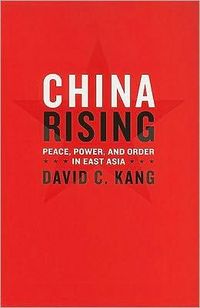

Purchase
Columbia University Press
December 2009
On Sale: December 4, 2009
296 pages
ISBN: 0231141890
EAN: 9780231141895
Paperback
Add to Wish List
Non-Fiction
Throughout the past three decades East Asia has seen more
peace and stability than at any time since the Opium Wars of
1839-1841. During this period China has rapidly emerged as a
major regional power, averaging over nine percent economic
growth per year since the introduction of its market reforms
in 1978. Foreign businesses have flocked to invest in China,
and Chinese exports have begun to flood the world. China is
modernizing its military, has joined numerous regional and
international institutions, and plays an increasingly
visible role in international politics. In response to this
growth, other states in East Asia have moved to strengthen
their military, economic, and diplomatic relations with
China. But why have these countries accommodated rather than
balanced China's rise? David Kang believes certain
preferences and beliefs are responsible for maintaining
stability in East Asia. Kang's research shows how East Asian
states have grown closer to China, with little evidence that
the region is rupturing. Rising powers present opportunities
as well as threats, and the economic benefits and military
threat China poses for its regional neighbors are both
potentially huge; however, East Asian states see
substantially more advantage than danger in China's rise,
making the region more stable, not less. Furthermore,
although East Asian states do not unequivocally welcome
China in all areas, they are willing to defer judgment
regarding what China wants and what its role in East Asia
will become. They believe that a strong China stabilizes
East Asia, while a weak China tempts other states to try to
control the region. Many scholars downplay the role of ideas
and suggest that a rising China will be a destabilizing
force in the region, but Kang's provocative argument reveals
the flaws in contemporary views of China and the
international relations of East Asia and offers a new
understanding of the importance of sound U.S. policy in the
region.
Comments
No comments posted.
Registered users may leave comments.
Log in or register now!
| 


 © 2003-2024 off-the-edge.net
all rights reserved Privacy Policy
© 2003-2024 off-the-edge.net
all rights reserved Privacy Policy